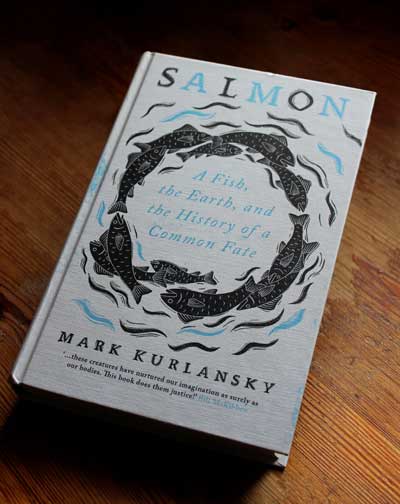Be fruitful, and multiply, and replenish the earth, and subdue it: and have dominion over the fish of the sea, and over the fowl of the air, and over every living thing that moveth upon the earth.
Genesis 1:28
Published by Oneworld Publications in 2020, “Salmon”, by Mark Kurlansky follows in the tradition of his previous title, “Cod”, outlining human kinds historic interaction with the iconic fish species that is salmon, a species which could in time be viewed as a litmus test to indicate the survival or not of the human race. For there is a perception in certain circles that if salmon cease to exist humans will not be far behind.
Salmon’s narrative pulls no punches, it outlines very clearly how European culture has viewed the earth and its resources as there to be tamed and exploited for profit, whereas indigenous native cultures, in particular the American Indians, worked and lived in harmony with the land.
Kurlansky dedicates the book to the late Orri Vigfusson an Icelandic environmentalist who succeeded more or less before his passing in curtailing the commercial fishing for North Atlantic Salmon. That said, if as the book states there are only 1.5 million salmon left in the north Atlantic when on an average year the Pacific sockeye salmon run into Bristol Bay, Alaska alone numbers 50 plus million, then we have a lot not to be proud of as humans.
The above grainy image taken sometime in the 1960′s shows my Grandfather Redmond, Mum and Dad holding up four salmon caught in trammel nets which would have been set along the south beach in Greystones, Co. Wicklow. My memories of going out fishing post 1970 when we returned from England to live was that salmon were common then. In fact lobster and salmon were regularly served up in Granny Redmond’s house back then.
The above is backed up by Kurlansky, historically North Atlantic salmon runs in Europe and the eastern states of America were as prolific as Pacific salmon runs to Alaskan rivers are today. Riverine obstructions such as dams, various forms of pollution and over fishing primarily but not totally at sea having over centuries reduced the vast North Atlantic salmon stocks to what they are today. In the past, salmon was a staple of the European diet only becoming a luxury the more scarce it got.
The key facts that emerged for me from the whole book were that the native Americans had no word for famine because they never went hungry, that there were salmon fishing cultures within all the coastal states east and west and that there were anything from 150,000 to 300,000 inhabitants per coastal state all fishing for and reliant on salmon. That they smoked it, salted it, dried it and traded the fish commercially for thousands of years while never reducing the runs, yet within 400 years “sophisticated” Europeans by their actions succeeded in bringing the North Atlantic salmon to its knees on both sides of the pond and making a good fist of ruining Pacific salmon runs on many a western American river.
The only reason today that salmon run so prolifically in Alaska is the lack of human settlement, however even these runs are under threat due to a proposed open cast gold mine which if it goes ahead will be one mile wide and a quarter mile deep and in the process will destroy 3000 acres of wetlands and 21 miles of salmon spawning streams. Have we learned nothing? Reading Kurlansky’s “Salmon” would be a good start……….




